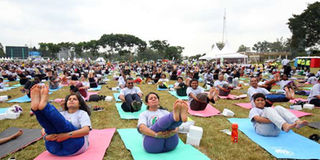THAT’S LIFE: Seek progress not perfection, always

People participating in Yoga practise at the University of Nairobi grounds on June 21,2015 as they joined the World in Marking the first United Nations International Yoga Day. There’s a good reason why Yoga exercises are called poses. FILE | EVANS HABIL |
What you need to know:
- Consider this. Human beings start off as babies, totally dependent on a parent or a caregiver.
- With time, and some tentative progressive steps, they learn to walk, talk and eat on their own.
- In about 20 years, they transition into adulthood and then they must learn a new set of skills for the journey ahead.
There’s a good reason why Yoga exercises are called poses. They do look like you are posing for that perfect Kodak moment, belaying just how difficult each move is. Figuring that a little more physical flexibility would not hurt, I signed up for a yoga class sometime late last year. That first day I was like a clumsy old clown whose limbs simply refused to twist this way and that. Even touching my toes was an exercise in frustration. Those were the longest 30 minutes of activity in my life. At the end of it, I was tempted to give up and consign myself to a future of stiff limbs. However, the teacher was encouraging, “It gets better. You just have to keep at it,” he said.
I decided to take him at his word and booked another class. True to his word, there was some improvement plus I now knew how to do the child’s pose (which is generally difficult if you are not one). About a month in, I begun to reap the benefits, my body moved with ease and I was finally able to complete some poses without toppling over on the mat in an embarrassed mess. While I am no where near yogi status, today I can report on my progress which includes being able to do a headstand, with some assistance albeit. The point of it all, I’m learning, is to seek progress, not perfection. And isn’t life like that?
Consider this. Human beings start off as babies, totally dependent on a parent or a caregiver. With time, and some tentative progressive steps, they learn to walk, talk and eat on their own. In about 20 years, they transition into adulthood and then they must learn a new set of skills for the journey ahead. They learn to negotiate at work, compromise in love and be prudent with money. Well, at least they should learn. Unfortunately as grown ups, it is easy to think our growth or progression is over simply because we are not growing taller. It is a great tragedy to imagine we have nothing else to learn. When we dig in our heels and refuse to progress, time has a way of making us irrelevant. If we are not growing on the job, relationship or with our health, we are dying in those areas. There’s no such thing as being in limbo, we are either progressing or regressing.
One woman who had been confined to a hospital bed for several months told me that she had to relearn a lot of basics, like walking. We sort of expected that her body would regain strength and she would do what she had always done. Apparently not. Her muscles had grown soft and they would have to be re-trained as it were. Things do not stay in inertia. The same applies to objects like houses and cars. If they do not receive progressive care and maintenance, they fall into disrepair. In life we have to take daily steps and actions towards the things that are meaningful and important. We have to make daily sacrifices as we create our desired life. It is easy to be put off because the moment, the circumstances, timing and we ourselves are far from perfect. It is easy to give in to spend that Sh1,000 rather than save it. Yet how much further you can go if you save it and invest it, consistently, progressively. With time, you find you have a neat little nest egg. This concept is particularly apt when it comes to raising children. All our effort, and training seems to be falling on deaf ears, but if you keep at it consistently, you will see progress, even if it comes in your old age. Don’t be put off because your child is not doing something or being something perfectly. Are they making progress? Be thankful for that.
Taking the progress not perfection approach allows us to deal with setbacks on the way. Say, you have been practicing a healthy lifestyle and you have a few slip-ups. Rather than be dejected by the imperfect journey and process, you can choose instead to celebrate the small steps, the journey, the progress.
Finally, perfection is an exercise in futility for imperfect people living in an imperfect world. When we realise this, just taking one step forward is the real deal. And that is always progress.





